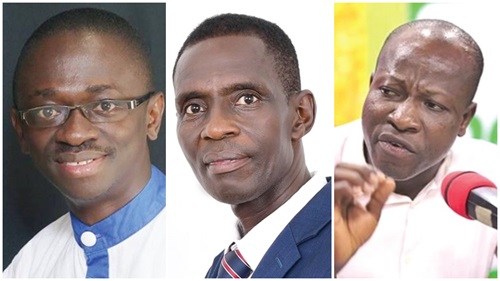A former Acting General Secretary of the Convention People’s Party (CPP), Dr James Kwabena Bomfeh Jnr, has stated that the increasing monetisation of politics is breeding a culture where money supersedes merit.
He said it had also become an avenue where political ambition was shaped not by service but by solvency.
“Such a system corrodes internal party democracy and undermines public trust, thus killing democracy softly, as highlighted by the Institute of Economic Affairs and Political Parties on Party Financing in 2003,” he said. Parties made commitments to curtail what was then emerging as a disturbing phenomenon.
Dr Bomfeh Jnr was speaking in an interview in response to a former Speaker of Parliament, Prof. Mike Oquaye’s disapproval of the GH¢4 million development fees imposed by the New Patriotic Party (NPP) on presidential aspirants.
Dr Bomfeh Jnr said the issue was a serious constitutional and moral alarm and that Prof. Oquaye’s assertion that “moneyocracy is not democracy” underscored a growing tension between financial affluence and democratic inclusion.
“It exposes the drift away from a value-based and merit-inviting public service to an unbridled material acquisitive craze for position or power.
“When political engagement overplays money, the nation risks turning elections into auctions, where competence is sidelined and leadership becomes a commodity for money gamblers,” he stated.
Logistics
Dr Bomfeh Jnr said any justification that the fee supported the cost of primaries and administrative logistics was not without merit.
“Yes, political parties require resources to function effectively, especially in an era of expansive voter outreach, digital infrastructure and security arrangements. However, the scale and structure of such fees must be proportionate, transparent and inclusive,” he stated.
He stressed that higher fees risk creating biases for the “affluent” or “externally sponsored”, thereby excluding grassroots leaders, civil society advocates and policy intellectuals who may have no big money but ideas.
“This financial barrier could indeed lead to ‘elimination by rough tactics’, where aspirants are priced out before ideas are even debated,” he stated.
Solutions
Dr Bomfeh Jnr, who is also a lecturer at the University of Professional Studies, Accra, said the issue of monetisation of politics had grown more monstrous.
To tackle monetisation, he suggested public fundraising platforms that allow supporters to contribute transparently; state-supported party financing, tied to performance, audits and accountability metrics.
He also recommended in-kind contributions and volunteer mobilisation to reduce overhead costs.
“In sum, democracy thrives when ideas, not bank accounts, compete for public trust,” he stated.
Warning
Dr Bomfeh Jnr said the alarm about monetisation of politics was a civic warning, stressing that “if unheeded, it could degenerate Ghana’s challenged democracy of elitism and exclusion.
“Parties must remember that legitimacy stems not from affluence but from service and allegiance to the people in a fair, transparent and renewed commitment to merit-leadership,” he stated.
Corrosive influence
On his part, the Dean, Office of International Relations of the University of Cape Coast, Professor Samuel Bert Boadi-Kusi said Prof Oquaye’s critique should serve as a timely reminder that democracy must be protected from the corrosive influence of money.
He said Professor Oquaye’s concerns deserve reflection.
“A fee of this magnitude risks excluding aspirants who may be rich in ideas but modest in means.
It could undermine meritocracy, sideline grassroots candidates, and incentivise illicit fundraising, eroding public trust,” he said.
Prof Boadi-Kusi said the issue highlighted a broader challenge across Ghana’s political landscape as financing was opaque, uneven, and increasingly exclusionary.
“If left unaddressed, our democratic ecosystem may become inaccessible to ordinary citizens.
Political parties are public institutions with constitutional obligations, and their internal decisions must promote inclusive participation,” he stated.
He said while it was fair for aspirants to contribute, the financial burden must be regulated and kept within reasonable bounds through open, democratic party structures.
“Leadership must remain open to all not just the affluent,” he stated.
Antidote
To reconcile financial sustainability with democratic integrity, Prof. Boadi-Kusi urged political parties to innovate through tiered contribution models, crowdfunding, donor support, and transparent audits can help fund internal elections without compromising fairness.
Dr Darkwa
On his part, a political scientist, Dr Samuel Kofi Darkwa, said political parties must move beyond reliance on a few wealthy financiers.
He said options available to the parties included membership subscription schemes, small-donor digital platforms, business ventures aligned with party values and fundraising events that actively involve the rank and file.
“By diversifying revenue sources, the burden will be shared more broadly, reducing the perception that money buys influence,” he stated.

